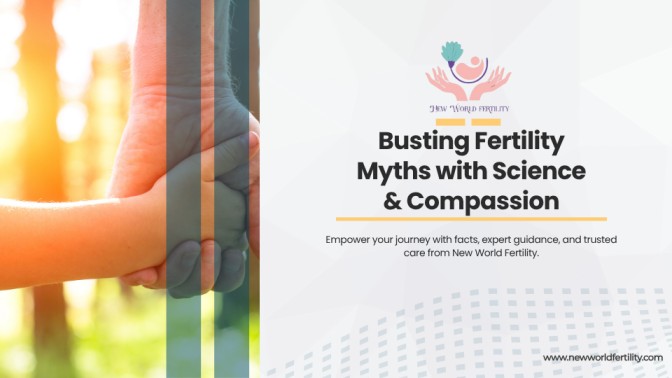| New World Fertility
Introduction: Don’t Let Myths Delay Your Parenthood
In today’s information-heavy world, it’s easy to get misled by well-meaning advice, outdated beliefs, or online misinformation — especially when it comes to fertility. These myths not only create fear but often delay proper diagnosis and treatment.
At New World Fertility, we believe in empowering you with facts, not fiction. Here are 12 common fertility myths — busted by real experts — so you can make confident decisions on your fertility journey.
Myth 1: Fertility is a Women’s Problem
Truth:
Infertility affects men and women equally. Around 40–50% of infertility cases are linked to male factors such as low sperm count, motility issues, or hormonal imbalances.
Expert Tip: Always assess both partners when facing conception issues.
Myth 2: You Can’t Get Pregnant After 35
Truth:
While fertility declines with age, many women successfully conceive in their late 30s and early 40s — especially with IVF or assisted reproductive technologies.
New World Fertility offers personalized treatments based on your age and ovarian reserve, not just your birth year.
Myth 3: If You Already Have a Child, You’re Fertile for Life
Truth:
This is called secondary infertility, and it’s real. Health conditions, lifestyle changes, or age can affect your ability to conceive again.
Myth 4: Stress Alone Causes Infertility
Truth:
Stress can affect hormonal balance but is rarely the sole cause of infertility. However, chronic stress may delay ovulation or impact sperm quality.
We recommend integrating fertility counseling with medical treatment for holistic results.
Myth 5: Birth Control Causes Permanent Infertility
Truth:
There’s no evidence that birth control pills, patches, or IUDs cause long-term fertility issues. Fertility typically returns within weeks to months after stopping contraception.
Myth 6: Frequent Sex Decreases Sperm Count
Truth:
Frequent ejaculation doesn’t harm sperm quality if the man is healthy. In fact, regular sex (every 2–3 days) is ideal for couples trying to conceive.
Myth 7: Healthy People Don’t Face Fertility Issues
Truth:
Even the healthiest individuals may face genetic, anatomical, or unexplained fertility challenges. Fertility isn’t always tied to physical fitness or outward health.
Myth 8: IVF Guarantees a Baby
Truth:
While IVF has high success rates, it’s not a guarantee. Success depends on age, egg/sperm quality, and underlying conditions. At New World Fertility, we provide realistic guidance and transparent outcomes.
Myth 9: Irregular Periods Mean You’re Infertile
Truth:
Irregular cycles may suggest ovulatory disorders but don’t mean you're infertile. Many women with PCOS or thyroid issues still conceive with the right care.
Myth 10: You Must Try for a Year Before Seeing a Doctor
Truth:
If you’re under 35, yes — wait up to a year. But if you’re over 35, have known conditions, or past pregnancy losses, seek help after 6 months.
Myth 11: Herbal Remedies Can “Cure” Infertility
Truth:
While some supplements may support reproductive health, relying solely on herbs without medical intervention may waste crucial time. Evidence-based treatment always comes first.
Myth 12: Male Fertility Doesn’t Decline with Age
Truth:
Men remain fertile longer, but sperm quality, motility, and DNA integrity decline after age 40. This can affect pregnancy outcomes and baby’s health.
Bonus Myth: You Can’t Improve Fertility Naturally
Truth:
In many cases, healthy lifestyle changes — balanced diet, weight management, quitting smoking/alcohol, stress reduction — significantly enhance fertility outcomes.
New World Fertility – Where Myths Meet Medical Science
Whether you’re starting your fertility journey or feeling stuck due to misinformation, New World Fertility is here to provide clarity, care, and cutting-edge support.
State-of-the-art labs
Expert embryologists
Customized IVF & IUI plans
Compassionate counselors
Transparent success rates
Visit: www.newworldfertility.com
FAQs: Fertility Myths vs Facts
Can stress alone prevent pregnancy?
No, but it can delay ovulation or reduce libido, which affects timing.
Does age affect male fertility too?
Yes. Sperm quality declines with age, especially after 40.
Are irregular periods always a sign of infertility?
Not always. Many women with irregular cycles conceive with medical support.
Is IVF 100% effective?
No. It offers great chances, but success depends on several medical factors.
Can a man’s health impact pregnancy outcomes?
Yes. Lifestyle, age, and sperm health directly affect fertility and embryo quality.
Final Words: Fertility Starts With the Truth
When it comes to fertility, knowledge is power. Don't let myths mislead you — consult specialists, understand your body, and take steps based on science, not superstition.
Have a fertility question? Ask the experts at New World Fertility — your trusted partner on the path to parenthood.

 Jun-29-2025
Jun-29-2025